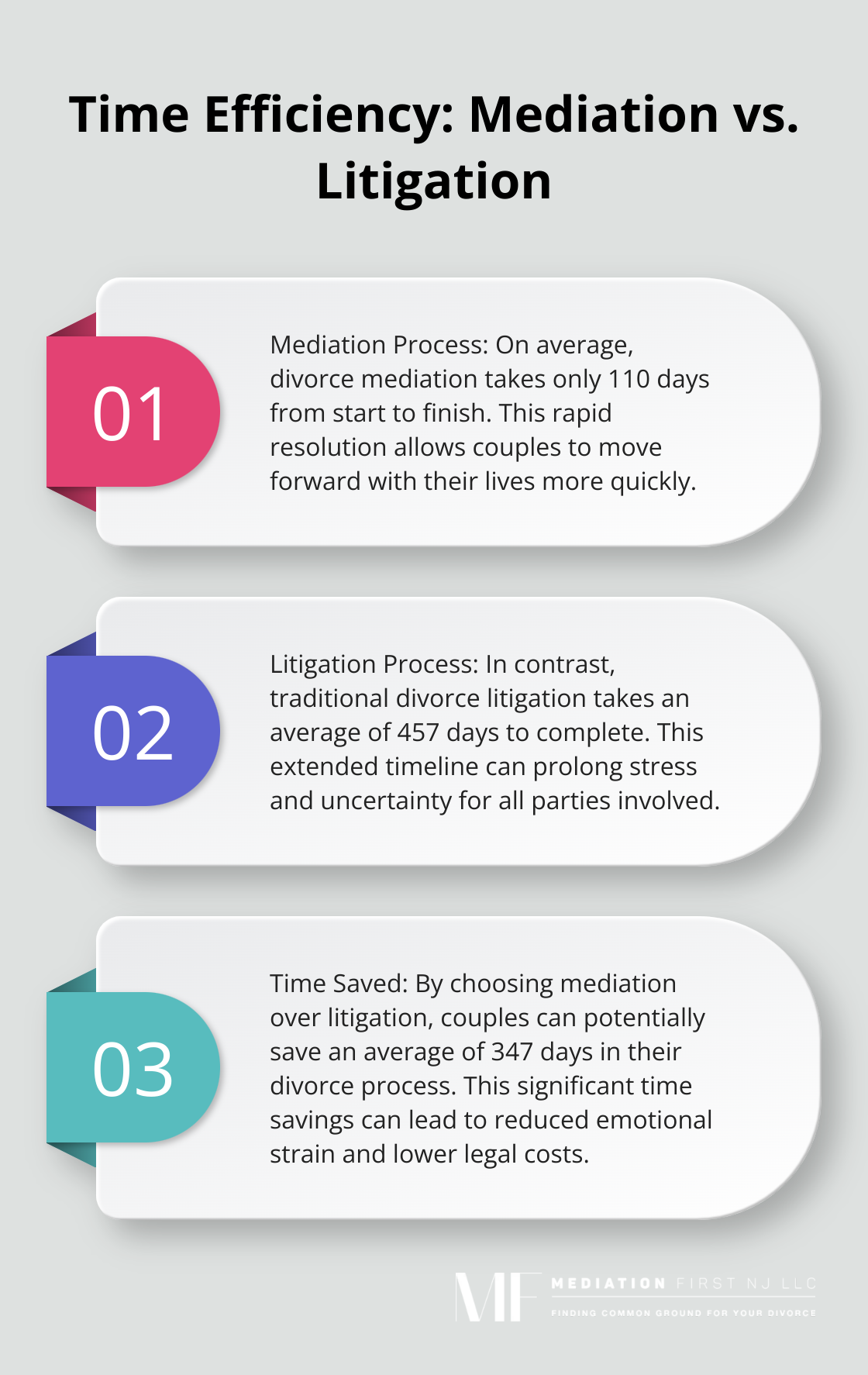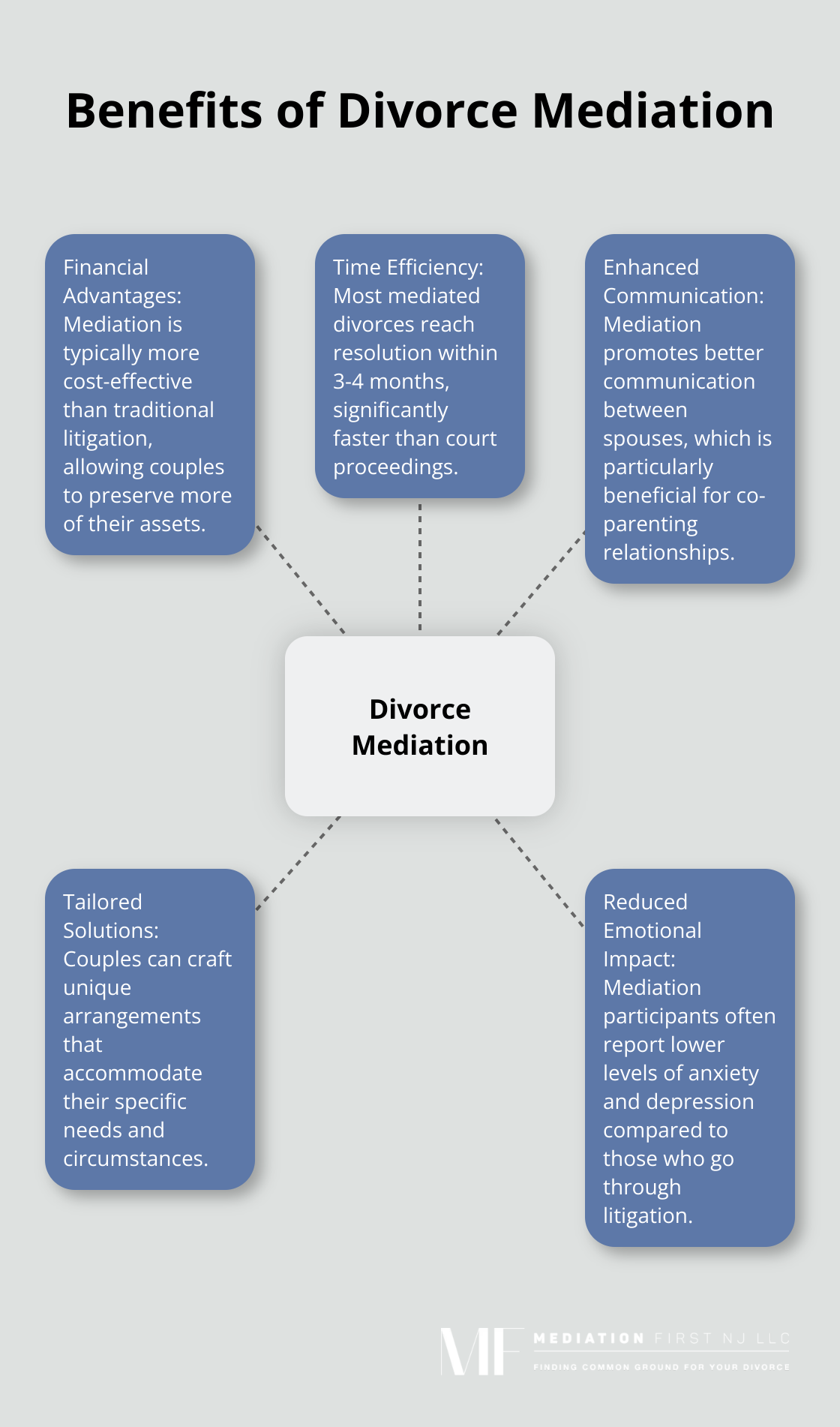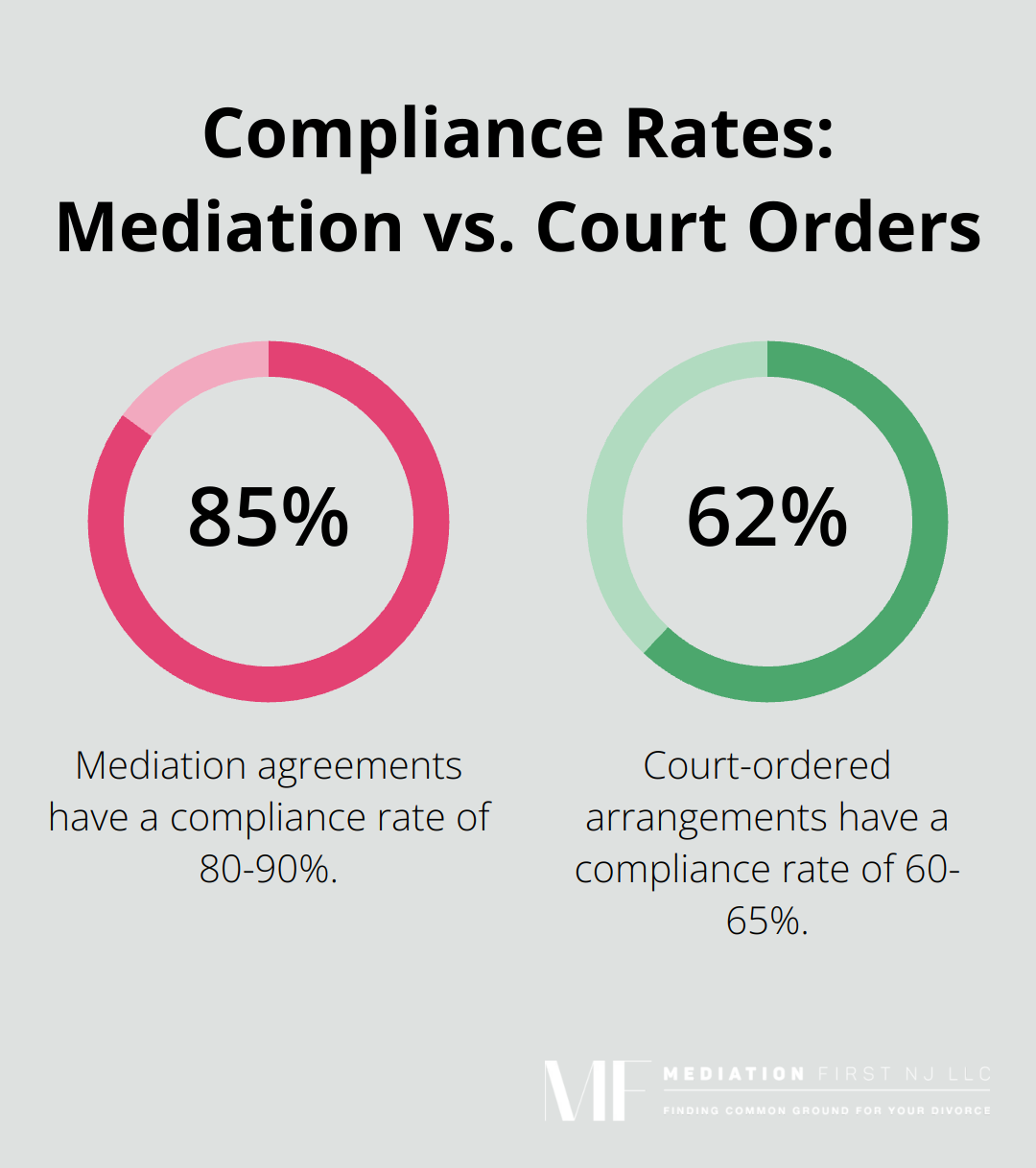Divorce can be a challenging and emotionally draining process. At Mediation First NJ LLC, we understand the complexities involved and offer a more amicable alternative.
Divorce mediation provides couples with a collaborative approach to resolving their differences. This method can lead to faster, more cost-effective, and less stressful outcomes compared to traditional litigation.
What Is Divorce Mediation?
The Essence of Divorce Mediation
Divorce mediation is a voluntary process where a neutral third party (the mediator) assists couples in navigating the complexities of ending their marriage. This approach offers a more collaborative and less adversarial alternative to traditional litigation. At its core, divorce mediation empowers couples to make their own decisions about their future. Unlike litigation, where a judge makes binding rulings, mediation allows spouses to work together to find mutually acceptable solutions. This process typically covers all aspects of divorce, including asset division, child custody, and financial support.
Mediation vs. Litigation: Key Differences
The contrast between mediation and litigation is stark. In court, each party’s lawyer argues their case before a judge, often leading to increased conflict and stress. Mediation, on the other hand, focuses on open communication and problem-solving. A study found that in divorce cases, mediation took an average of 110 days from start to finish, while litigation took an average of 457 days.

The Mediator’s Role
A skilled mediator acts as a neutral facilitator, not an advocate for either party. They guide discussions, ensure both parties are heard, and help identify areas of agreement. Mediators are trained to manage emotions and keep conversations productive, even in high-conflict situations.
Confidentiality and Control
One significant advantage of mediation is confidentiality. Unlike court proceedings (which are public record), mediation discussions remain private. This privacy allows for more open and honest communication. Additionally, couples retain control over the outcome, rather than leaving decisions to a judge who may not fully understand their unique circumstances.
Cost and Time Efficiency
Mediation typically costs significantly less than litigation. The American Arbitration Association reports that mediation is generally more affordable than litigation or arbitration, requiring less time and fewer resources. It’s also generally faster, often concluding in a few sessions rather than extending for months or years.
As we move forward, let’s explore the numerous benefits that choosing divorce mediation can bring to couples seeking a more amicable and efficient resolution to their marital dissolution.
Why Choose Divorce Mediation
Financial Advantages
Divorce mediation offers a collaborative, cost-effective alternative to traditional litigation. The average expense for a contested divorce in the U.S. typically falls between $15,000 and $20,000, with complicated cases potentially costing more. Mediation can often be a more affordable option, allowing couples to preserve more of their assets for their post-divorce lives.
Time Efficiency
The mediation process outpaces court proceedings in terms of speed. While litigation can extend for months or even years, most mediated divorces reach resolution within 3-4 months. This accelerated timeline enables couples to move forward with their lives more quickly.
Enhanced Communication
Mediation promotes better communication between spouses. Research indicates that couples who use mediation often experience improved ability to communicate with their ex-spouse after divorce. This enhanced communication proves particularly beneficial for co-parenting relationships.
Tailored Solutions
Unlike court-imposed decisions, mediation allows for creative and customized solutions. Couples can craft unique arrangements that accommodate their specific needs and circumstances (such as work schedules and children’s activities). This flexibility often results in more satisfactory outcomes for all parties involved.
Reduced Emotional Impact
The collaborative nature of mediation often leads to less emotional stress. A study in the Conflict Resolution Quarterly found that mediation participants reported significantly lower levels of anxiety and depression compared to those who went through litigation. This emotional benefit extends to children as well, who are less likely to experience the negative effects of a contentious court battle.

As we explore the next phase of the divorce mediation process, you’ll see how these benefits translate into practical steps towards a more amicable and efficient resolution.
How Does the Divorce Mediation Process Work?
The divorce mediation process offers a structured yet flexible approach to resolve marital disputes. This method guides couples through each step, ensuring a thorough and fair resolution.
Preparation for Mediation
The process starts with an initial consultation. During this meeting, the mediator explains the process, answers questions, and assesses the suitability of mediation for your situation. It’s important to come prepared with financial documents (including tax returns, bank statements, and property valuations). The American Bar Association suggests gathering these materials before your first session to streamline the process.
Identification of Key Issues
Once mediation begins, the first task involves identifying all issues that require resolution. These typically include asset division, debt allocation, child custody, and support arrangements. Research suggests that the process of real-life divorce mediations can be examined as a dynamic system, with interaction dynamics playing a crucial role in successful negotiations.
Negotiation and Problem-Solving
The core of mediation lies in the negotiation phase. Here, both parties discuss their needs and concerns, working towards mutually acceptable solutions. The mediator facilitates these conversations, ensuring both voices are heard. According to the Journal of Divorce & Remarriage, successful mediations often involve 3-4 sessions (each lasting 2-3 hours).
Agreement Drafting
As consensus emerges on various issues, the mediator drafts a Memorandum of Understanding (MOU). This document outlines all agreed-upon terms. It’s essential to review this carefully, possibly with independent legal counsel. Recent data shows that post-divorce mediation compliance rates reach 80-90%, significantly higher than the 60-65% compliance rates for court-ordered arrangements.

Settlement Finalization
The final step transforms the MOU into a legally binding agreement. This document is then submitted to the court for approval, marking the official end of the marriage. The entire process, from initial consultation to final agreement, typically takes 2-4 months, significantly faster than the average litigated divorce (which can take a year or more).
Final Thoughts
Divorce mediation provides a faster, more cost-effective, and less emotionally taxing path to resolution compared to traditional litigation. Couples who choose this collaborative approach maintain control over their divorce process and craft solutions tailored to their unique circumstances. The benefits of divorce mediation extend beyond the immediate process, often leading to improved post-divorce relationships and co-parenting dynamics.
A skilled mediator guides discussions, manages emotions, and ensures both parties are heard and understood. Mediation First NJ LLC specializes in expert divorce mediation services, helping New Jersey couples navigate this challenging transition with compassion and professionalism. We support couples through every step of the mediation process, from initial consultation to final agreement.
Divorce mediation saves time and money while preserving relationships and empowering you to shape your future. This approach sets the stage for a more amicable separation and a smoother transition to post-divorce life. We encourage you to explore the potential of mediation as you consider your options for divorce (a peaceful resolution is possible with the right support).

